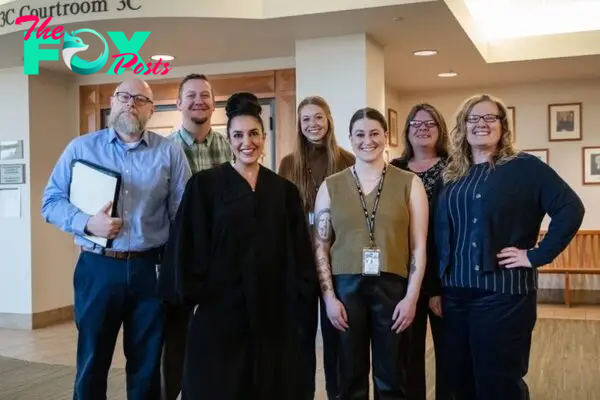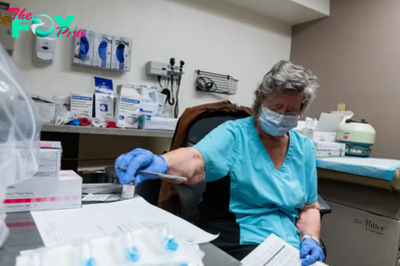Health
Colorado courts are increasingly creating “competency dockets” to help link people with mental health conditions to community-based services
A man in an orange Larimer County jail jumpsuit grew defiant within moments of entering a Fort Collins courtroom — raising his voice as he spoke to a judge.
As he sat at a table beside a lectern, the man said he wanted to fire his attorney that day because he believed the lawyer was trying to kill him.
☀️ READ MORE
U.S. 50 bridge closure an “immediate 911 deal” for Gunnison Valley Hospital
Durango’s hotel-to-housing project financing is a first in Colorado
A billionaire’s fence is the latest fault line in a 150-year-old San Luis Valley land war
Each time he spoke, Chief Judge Susan Blanco calmly interrupted, and asked him to create a plan that could help him stabilize and stay out of jail.
“Whatever you think is going to make you the most successful after you leave, let’s work on that, please,” she said during the April 11 court hearing.
The man was one of 24 people on the competency docket that day at the Larimer County Justice Center, a unique and specialized court program that links defendants with debilitating mental health conditions accused of crimes in the county to rehabilitation and legal education services that hopefully stabilize them enough, so they can begin to understand their court proceedings and effectively aid in their defense.
The model is so promising, 10 Colorado judicial districts and Denver County Court have launched similar speciality courts. The goal is to help participants get community-based services as often as possible and the court aims to reduce recidivism while also improving public safety.
Before the 8th Judicial District became the first to launch the inaugural competency docket, people with severe mental illness languished for months in the Larimer County jail, waiting for psychiatric services and being detained for crimes for which they had not been convicted.

Just over 120 people are on the 8th Judicial District ’s competency docket at any given time and 20 to 30 people are scheduled to appear each Thursday — a relative handful compared to the 8,554 cases that were filed in the Larimer County District Court between July 2022 and last June.
“The spirit of comPetency dockets started to get everyone in the same room to discuss significant mental Health issues such as dementia and intellectual disabilities and to pull together resources in the community to help them get away from the court system, or if they go through it, to give them resources, so they don’t return,” said Amanda Myers, criminal justice programs unit manager at the state court administrator’s office.
“But, with that, you have to have resources,” she said. “In some judicial districts, the barrier seems to be a lack of staff in order to run this. And some judicial districts might be waiting to see how some of these dockets roll out and what they can learn from them before implementing their own.”
A judge, attorneys, mental health providers, doctors, nurse practitioners, housing organizations and case managers are among approximately two dozen essential staff members who help run the 8th Judicial District’s competency docket, said Gene Klivansky, competency services team lead in the community justice alternatives division for Larimer County.

On Friday, Klivansky drove a man living near Greeley to Fort Collins and back so that he could receive an injectable medication for his mental illness.
“I was on the road for two and a half hours, but the guy is doing well and we want him to do well,” Klivansky said. “This is kind of a whatever-it-takes approach to provide stability and options to people, so they don’t have to be stuck in the jail languishing, especially on minor charges.”
It can take seven months for a psychiatric bed to open at the state hospital in Pueblo, Klivansky said.
More than 15 people in Larimer County who were ordered to receive inpatient restoration are currently waiting for those services that will likely occur at a state psychiatric hospital, he said.
On Friday afternoon, there were 313 people in Colorado waiting for a bed at an inpatient psychiatric facility, with an average wait time of 92 days, said Jordan Saenz, communications manager for the Office of Civil and Forensic Mental Health, which operates Colorado’s two mental health hospitals and provides pretrial restoration services, among other things.
The need for competency dockets across the state is increasing since the COVID-19 pandemic, which disrupted behavioral health services and exacerbated concerns about a rise in mental health conditions such as depression and anxiety, said Amanda Duhon, chief deputy district attorney for the 8th Judicial District, the Larimer County court, based in Fort Collins.
And now, Colorado courts are increasingly raising concerns about people’s ability to understand their court proceedings and aid in their own defense.
Courts statewide ordered restoration services, or basic legal education courses and case management, for people who were too ill to understand their court cases 2,737 times during fiscal year 2022-23, up from 1,054 times during fiscal year 2017-18, a 159.7% increase, Saenz said.
-

 Health2h ago
Health2h agoThe Surprising Benefits of Talking Out Loud to Yourself
-

 Health3h ago
Health3h agoDoctor’s bills often come with sticker shock for patients − but health insurance could be reinvented to provide costs upfront
-

 Health19h ago
Health19h agoWhat an HPV Diagnosis Really Means
-

 Health1d ago
Health1d agoThere’s an E. Coli Outbreak in Organic Carrots
-

 Health1d ago
Health1d agoCOVID-19’s Surprising Effect on Cancer
-

 Health2d ago
Health2d agoWhat to Know About How Lupus Affects Weight
-

 Health5d ago
Health5d agoPeople Aren’t Sure About Having Kids. She Helps Them Decide
-

 Health5d ago
Health5d agoFYI: People Don’t Like When You Abbreviate Texts



























